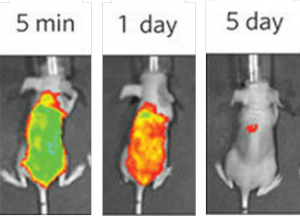Inocuous Nanotechnology-Based Sunscreen Tested in Pig and Mice

Researchers from Yale University funded by the National Institute of Biomedical Imaging and Bioengineering (NIBIB) have developed a sunscreen based on nanoparticles that carry UV-blocking elements. The particles stick to the skin surface without penetrating in the body, thus avoiding toxic effects that can result in cancer. The study has been published in the journal Nature Materials.
Currently available sunscreens contain UV-blocking agents that are effective in protecting the skin from the harmful effects of sunlight. However, there is evidence of the capacity of these compounds to penetrate the skin and end up in mammary tissue, the bloodstream or urine, eventually generating reactive oxygen species that can harm DNA and lead to cancer.
Dermatologists and molecular biologists from Yale collaborated to create a new sunscreen that doesn’t penetrate the body. Taking into account the specific characteristics of skin cells and using previous experience in nanoparticle-based drug delivery, the researchers engineered non-invasive, sunscreen-filled nanoparticles.
Padimate O-filled nanoparticles don’t penetrate pig skin
Bioadhesive nanoparticles (BNPs) were filled with the PABA-related sunscreen padimate O (PO), and tested on pigs and hairless mice. PO alone reached the bloodstream through blood vessels in deep skin layers, whereas encapsulated PO stayed on the skin surface. The capsules do not go away with water, but can be easily removed with a towel, and dissapear naturally in five days through exfoliation.
The nanoparticles were tested on mice for effectiveness in filtering UV light. The same filtering effect was achieved for a group of mice covered with commercial sunscreen than for another group treated with BNPs carrying only 5% of the amount of sunscreen applied to the first group.
Mice were also tested for the amount of reactive oxygen species (ROS) formed in their organisms as a consequence of UV-light exposed sunscreen. The study concluded that no damaging agents leaked out of the nanoparticles, thus ROS neither touched the skin nor filtered into deeper layers.
The study is a promising step towards a new sunscreen formulation. Future studies of the BNP-based sunscreen will be conducted in humans.
Source: NIBIB

